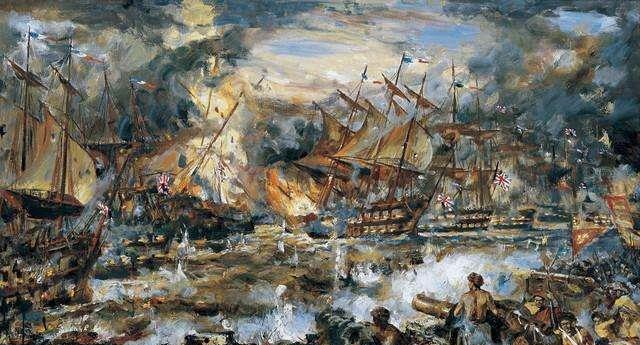In the late Qing Dynasty, famous generals used women's filth to swing the "hades array", and the resistance to the British was not successful, but became a laughing stock
In the official documents of the Qing Dynasty, whenever "foreign devils" were mentioned, for a long time, they were contemptuously called "Yi" with a sense of cultural superiority, such as "Yingyi" and "Fayi".
In Old Chinese, the word "Yi" was first used to refer to some remote tribes in eastern China. For example, the area around the Jiaodong Peninsula was known as "Dongyi" during the Zhou Dynasty. Later, the word "Yi" was used to refer to those barbarian states around China that were clearly behind China in terms of canonical artifacts. The use of "Yi" to refer to European and American countries obviously means that the Qing government regarded these European and American countries as "barbarian states" that were not even as good as Vietnam and Korea.

In the face of the swarming "foreign devils", Chinese readers first think of the ancient mythological works "The Classic of Mountains and Seas". In the heyday of Qianlong, the scholar Ji Xiaolan compared the legendary Europe and other places with the records in the Classic of Mountains and Seas. According to this logic, it is difficult for the residents living there to escape the image of those half-human and half-ghosts in the Classic of Mountains and Seas.
In fact, there are many people who have such ideas, not only one person. Before the outbreak of the Opium War, there was a popular view in Chinese society, that is, the British were "entangled in their legs and feet, difficult to stretch and flex, and unable to get up, so they were often frustrated."
In the later stages of the Opium War, the British army entered no man's land along the coast of China, conquered the south and the north, and was invincible, and the war situation was obviously unfavorable to the Qing court. In the twenty-first year of Daoguang, the Daoguang Emperor, who had been oscillating between "suppression" and "fu", decided to fight a battle, and he quickly removed the previous Chincha minister Qi Shan from his post and replaced him with Yishan, and also sent a "Guo Yong Marquis" Yang Fang who was good at combat as counselor minister of Chincha.
This Yang Fang is not an ordinary person, he went around fighting, because he was brave in battle, repeatedly made military achievements, and was promoted all the way, successively serving as a thousand generals, garrisons, capital divisions, guerrillas, staff generals, deputy generals, and general soldiers. Later, because of the quelling of the Yi uprising in Sichuan and other places, he was awarded the title of Marquis of Guoyong of the First Rank and became a meritorious general whom the Daoguang Emperor relied on.
After he arrived in Guangzhou, he met with Lin Zexu, who insisted on resisting the British, and on the other hand, he struggled with Yishan, who compromised and sought peace. He strongly advocated that the British army should be rejected on the outskirts of Guangzhou, and that the British army should never be allowed to enter the city of Guangzhou. He saw that the British artillery was almost empty, and believed that there was a magic in it, so he came up with a plan to "destroy evil with evil". He collected a large number of civilian toilets, carried women's dirty belts on bamboo rows, hung them on the walls of Guangzhou, and aimed them at the guns of the British army. He also did things at the City God Temple, loading rune water into the altar and burying it in the ground...
These strange deeds of General Yang Fang originated from an ancient Chinese belief in witchcraft, that is, for the things of the evil door, the evil door must be used to cure the evil door, in order to "attack the poison with poison." Obviously, in the eyes of this General Yang, the British devils are not human at all, they are monsters and other things, and the foreign guns and cannons they use are even more evil things, and for such demons and demons, they can only use filthy things such as toilets to make their spells fail.
This "method of warfare" is called the law of disgust, and today's readers may not be easy to understand. In fact, it is a "yin gate array" derived from the theory of wasted yin and yang.
Mr. Lu Xun also mentioned the "YinMen Array" in "Chao Hua Xi Shi", saying that when he was a child, the nanny said to him: "When there were soldiers outside the city to attack, Long Mao told us to take off our pants and stand on the city wall row by row, and the cannons outside could not be released, and if they wanted to put them again, they would explode." This passage of Lu Xun's remarks shows that the Taiping Heavenly Kingdom already had this "method of warfare."
On March 13, 1841, the war resumed, and the British army captured the Rhubarb Jiao Fort. Yang Fang's hard work and high hopes for the toilet tactics can not defeat the enemy. The filthy things against the British artillery basically had no effect, but wasted a lot of toilets. The Qing army was bombarded by The British warships and fled. The British captain drove straight in, and Yang Fang hurriedly withdrew his troops to the inner city of Guangzhou.
Doesn't this show that the Great Qing Dynasty, who prides himself on being a heavenly kingdom, has actually become an astonishingly ignorant general of the battlefield and the Guoyong Marquis Yang Fang, whose officials and people in Guangzhou rely on the Great Wall, have used such absurd methods to resist the enemy. With science and technology, Europe is marching forward, and the Heavenly Dynasty relies on superstition and ignorance. Even so, being violently beaten by others is indeed not unjust at all.